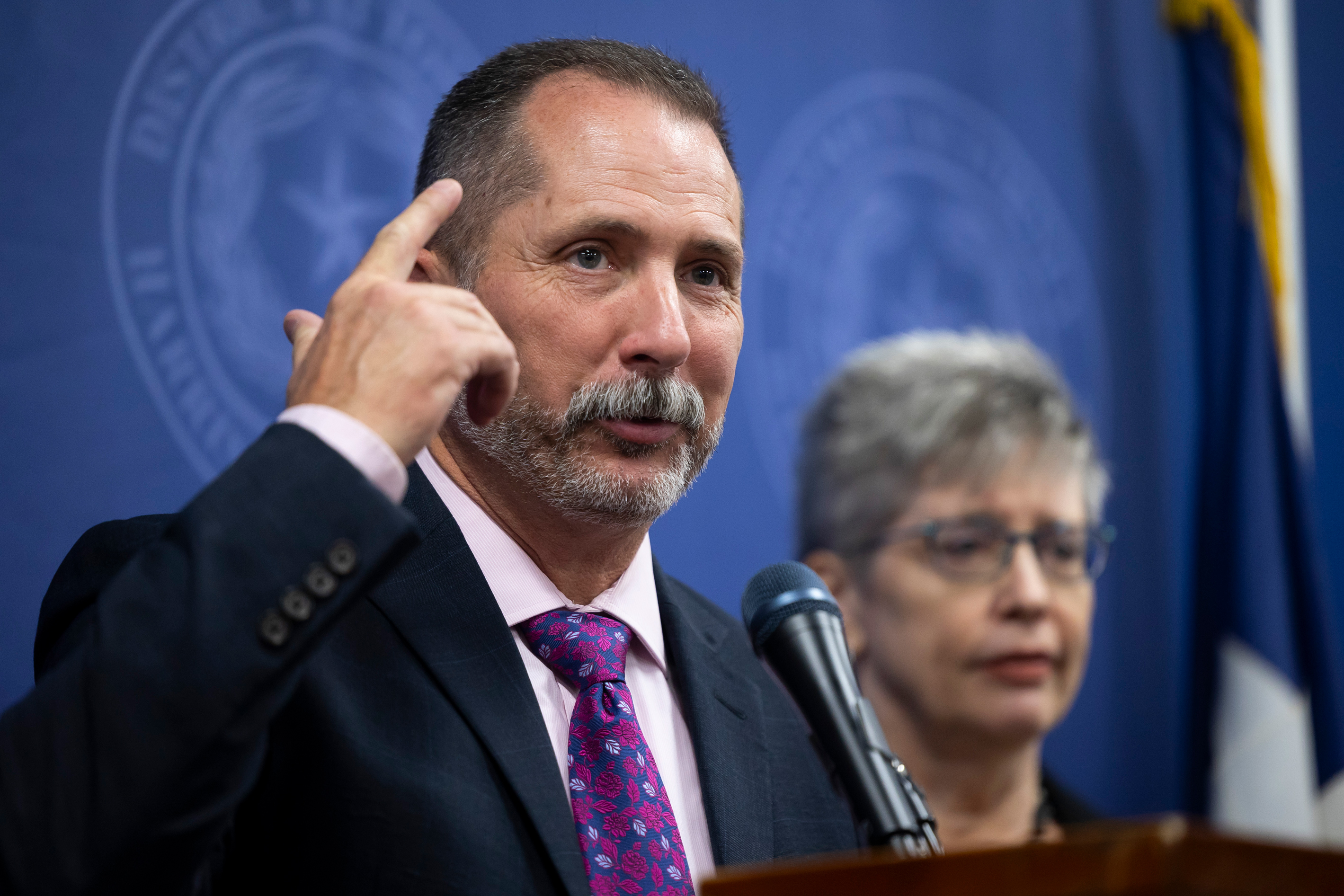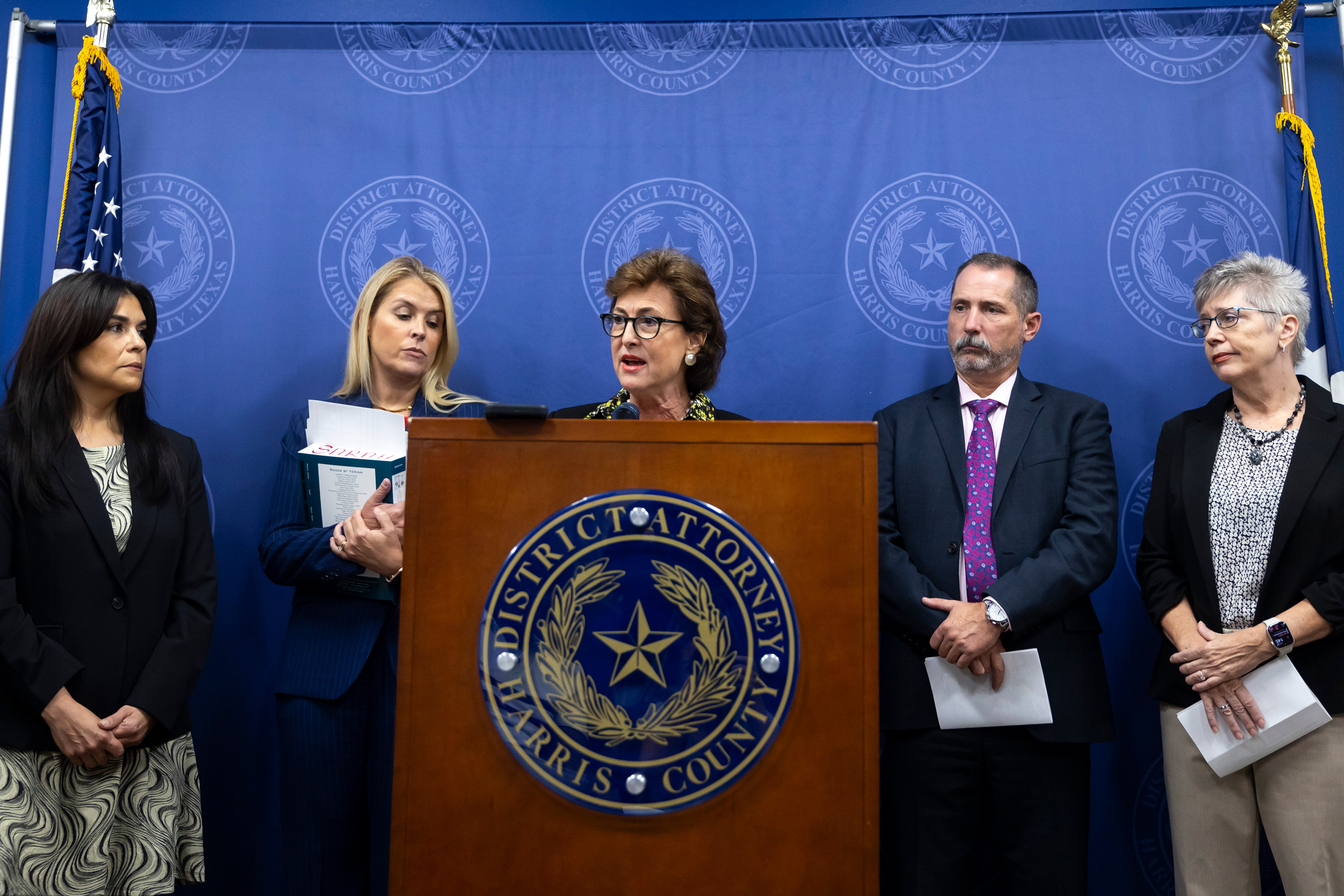|
Getting your Trinity Audio player ready...
|
The backlog at the Houston Forensic Science Center is causing major delays in prosecuting murder cases in Harris County, the district attorney’s office said ahead of a new law aimed at speeding up murder prosecutions.
Harris County District Attorney Kim Ogg joined prosecutors and advocates for law enforcement and crime victims at a news conference Wednesday to praise the new law, SB 402, which will go into effect on Friday. The law adds murder and capital murder to the list of case types that judges must prioritize when scheduling hearings and trials. Judges already had to prioritize child sexual abuse, domestic violence and a few other serious felony cases.

“This heightened relevance that the legislature has put on murder trials will positively affect and impact public safety in Harris County,” Ogg said.
Critics of the law, however, described the legislation as toothless, noting an absence of consequences for slow-moving cases and questioning whether it would have an impact.
“(Prosecutors) file their motion for a continuance, the judge gives them a stern look and we move on to the next case,” said Murray Newman, president of the Harris County Criminal Lawyers Association. “What (are) the teeth behind this?”
There were 1,816 capital murder and murder cases pending in Harris County as of Aug. 22, Ogg said. She pointed to a COVID-era spike in homicides and a higher solve-rate by law enforcement agencies as contributors to a mounting backlog – but flagged the Houston Forensic Science Center as the key source of delays.
“We work in a chain, like an assembly line, and the crime lab is a critical choke point,” Ogg said.
Data maintained on the Houston Forensic Science Center’s website showed roughly 4,000 evidence requests had gone more than a month without being fully analyzed and documented as of late August. Some of the agency’s most common requests – including fingerprint analysis and firearms examination – take an average of six months to nearly two years to complete, according to a July operations report.
In a statement, the Houston Forensic Science Center acknowledged existing challenges but defended its transparency and partnership with law enforcement agencies.
“HFSC continues to provide a clear and transparent picture of the organization’s turnaround times and backlogs so the various criminal justice partners are properly informed,” the statement said. “HFSC also continues to work with the Harris County District Attorney’s Office to prioritize cases when the organization is made aware of court dates. The entire system is challenged and demands proactive planning and cooperation by all the agencies.”
Peter Stout, the director of the Houston Forensic Science Center, was unavailable for comment Wednesday evening.
Sarah Seely, chief of the homicide division at the Harris County District Attorney’s Office, expressed concern that the backlogged crime lab could impede renewed efforts under SB 402 to shepherd murder cases to a speedy resolution.
“Our fear is that (judges) are going to demand we go to trial when we don’t have our scientific evidence,” Seely said. “We need our lab to conduct testing in a timely manner so that we can prosecute.”
Seely said the Harris County District Attorney’s Office should have a seat on the Houston Forensic Science Center’s board of directors to improve accountability. Ogg, meanwhile, called upon the mayor and city council to “fully fund” the crime lab.
“This is a problem that is not about finger-pointing,” Ogg said. “It’s about planning and funding. That’s what we’re asking city government to do.”
Inefficiencies at crime lab, DA’s office
The Houston Forensic Science Center has long been the target of criticism for lengthy delays in processing evidence. Most recently, the Houston Police Department’s union leadership called for the resignation of director Peter Stout, holding that he has had adequate time to resolve backlogs that are actively impeding law enforcement.

“He may be a great scientist, but obviously he’s a horrible manager,” said Doug Griffith, president of the Houston Police Officers’ Union, at the news conference Wednesday. “We need someone with a forensics background who can get in there and clear this backlog.”
Stout, meanwhile, maintains that the amount of backlogged requests in Houston is consistent with those in labs across the country, and said his agency minimizes the impact of the delays on victims by prioritizing violent crime cases.
Stout was hired to lead the Houston Forensic Science Center in 2014, soon after the center separated from the Houston Police Department following accusations of mismanagement, inadequate quality controls and corruption.
Stout, who has since been credited with turning around an agency once considered the worst in the country, has been transparent about the delays in evidence testing. Multiple times each year, the lab produces information on case counts, the length of pending requests and turnaround time – all broken down by type of request.
Critics have also leveled accusations of inefficiency at the Harris County District Attorney’s Office.
In 2019, the Harris County Commissioners Court contracted with an independent consulting group, PFM, to assess workload demands and staffing needs at the district attorney’s office.
The report, released in 2022, recommended the office implement “operational improvements” as well as adding new staff. Among other improvements, the report suggested the office “reconcile and streamline existing office policies and practices” and “prioritize office resources around violent crime and people with multiple convictions.”
“If HCDAO makes these operational improvements, invests in training, and receives strategic staffing investment from Commissioners Court, it will have a significant impact on court operations, jail population and community safety,” the report said.

‘None of this is just’
It was not immediately clear Wednesday what difference the new Texas law prioritizing murder cases would make in the Harris County courts.
“Court dockets are controlled by judges,” Ogg said. “This law simply tells them what is a priority, and it will be up to our judiciary to determine how they implement that in each court.”
Ogg said she hoped the courts would dedicate an emergency relief docket with visiting judges to homicide cases. Administrative judges for the Harris County district courts could not be reached Wednesday.
Defense attorneys, meanwhile, expressed skepticism that the law would meaningfully accelerate the processing of murder cases.
Attorneys on both sides of a murder trial already take such cases very seriously, said Newman.
“I think it’s kind of funny to insinuate that people are dodging murder trials,” he said.
Instead, Newman said delays often come from the prosecution, which bears responsibility for submitting evidence to the defense.
Newman said the backlog at the Houston Forensic Science Center is one factor that can make that job difficult.
“It’s usually not the (prosecutors’) fault,” Newman said. “It’s usually things they’re waiting on that are outside of their control.”
Alex Bunin, chief public defender at the Harris County Public Defender’s Office, similarly highlighted the Houston Forensic Science Center as a source of delays.
“We’re catching up with science,” said Bunin. “There’s so much more evidence in cases now. Even our simplest cases have multiple body cams, dash cams, forensic testing that needs to be done. All that is overloading the labs. That’s really what’s been a huge impediment to getting cases ready.”
There are no mentions of or provisions for crime labs in the new statute. In its statement Wednesday, the Houston Forensic Science Center referred to “the difficulties of balancing conflicting legislated priorities of sexual assaults and homicides.”
However, two mothers of murder victims who joined Ogg at the news conference Wednesday hoped the law will mitigate the agony they endured waiting for resolution on their cases.
“There is a little bit of sense of peace knowing that criminal justice has been served,” said Leticia Ybarra, whose daughter, Jessica Perez, was murdered in Harris County in 2020. “And without that, it’s pure agony, daily agony.”
Alison Steele, whose daughter, Cayley Mandadi, was murdered in Bexar County in 2017, echoed Ybarra’s anguish.
“None of this is just, none of it is humane, and none of it is good for our society,” Steele said. “Fortunately, there is a solution, and that is to prosecute murder cases as quickly as possible, as hopefully this new law will facilitate, so that society’s costs are minimized.”


